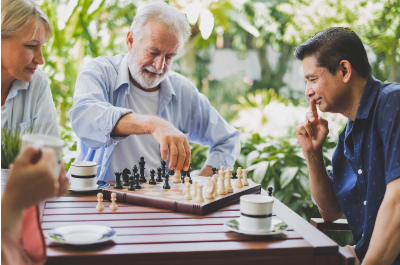It’s been over a year since the outbreak of the COVID-19 pandemic. Fortunately, we know a lot more about the virus and disease than ever before. More good news – several COVID-19 vaccines are being distributed, and senior citizens have been prioritized for the first stage of vaccinations, especially if they live in a residential or group care facility.
COVID-19: Fact vs. Fiction
It’s easy to get caught up in the news cycle and barrage of social media content. It’s even easier to get confused about what is true and what is fake. To make it easy for you, we have put together an updated explainer of what we know about COVID-19.
Claim: COVID-19 transmission is only possible if you’re near someone for more than 10 minutes and that person is infected.
Fact: The World Health Organization (WHO) states that transmission is possible in as little as 10 minutes. The risk of infection is higher the longer you spend around an infected person.
Claim: There is less reason to worry about infection during the summer months.
Fact: COVID-19 can be transmitted during the summer, and last summer’s infection numbers are proof of that.
Claim: Only the elderly should be worried about contracting or dying from COVID-19.
Fact: People of all ages are struggling with the long-term side effects of COVID-19. Social distancing is universally advised for all age groups.
Claim: There are remedies and cures for COVID-19 aside from the vaccine.
Fact: While you can limit some of your symptoms and discomfort with over-the-counter drugs and home remedies, there is no scientific evidence to suggest that these methods can cure or prevent COVID-19. If you are experiencing COVID-19 symptoms, consult your doctor regarding the best course of action in managing pain or discomfort.
Claim: The virus can live as long as 12 hours on a metal surface.
Fact: It was previously believed that the virus could only live as long as 12 hours on a metal surface, but it has been found that the virus is viable for up to 72 hours after contacting plastic and stainless steel.
Claim: Once I’m vaccinated, I don’t need to wear a mask anymore.
Fact: Once you are vaccinated, you can safely spend time indoors with other fully vaccinated individuals. However, it’s possible that you could still contract the virus and spread it to unvaccinated people. That is why we should all continue wearing masks for now.
What You Need to Know About the Vaccine
Who will get the vaccine first?
Senior citizens, healthcare workers, and other frontline workers are prioritized for the first stage of the vaccine. The federal government intends to distribute millions of vaccines a week, but the exact rate of vaccination will increase as availability increases. While the federal government is distributing the vaccine, states ultimately have the final say in how vaccines are administered. Pennsylvania has begun distributing its vaccine in stages. As of right now, all senior citizens 65 years and older are eligible.
Are there enough vaccines for everyone?
The truth is that it will take time to vaccinate everyone as it is challenging for manufacturers to keep up with the rate of constant demand. Pfizer has an agreement with the U.S. government to supply a total of 100 million vaccines, and there is room to negotiate an additional 500 million vaccines at a later date. The first round of manufacturing will include 50 million vaccines.
The Moderna vaccine will continue to be distributed in increasing increments until the demand has been met. Johnson & Johnson is also distributing its vaccine across the country.
What happens after I get the vaccine?
If you get the one-dose Johnson & Johnson vaccine, you are done. If you get the Moderna or Pfizer vaccines, you will need a second dose three or four weeks later.
Although clinical trials have shown that the vaccine has a noticeable effect on the severity of symptoms and illness, we still lack the data to determine if it’s effective at preventing transmission.
Some people may experience headaches, chills, or muscle soreness at the injection site, but these symptoms typically subside within a few days.
For more information about the ongoing pandemic, what we are doing to keep our residents safe throughout COVID-19, and tips for maintaining your personal safety, contact our team today.





